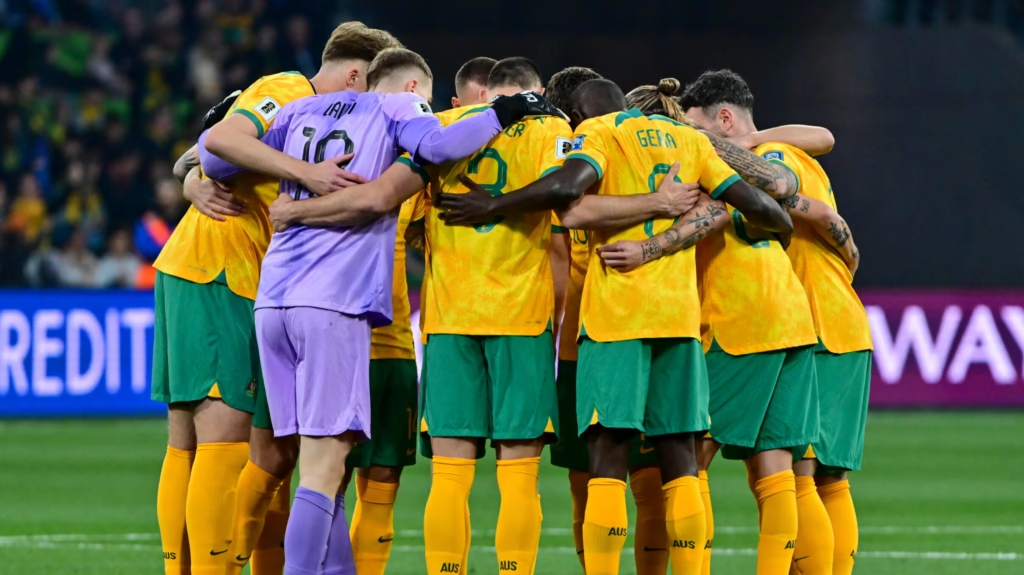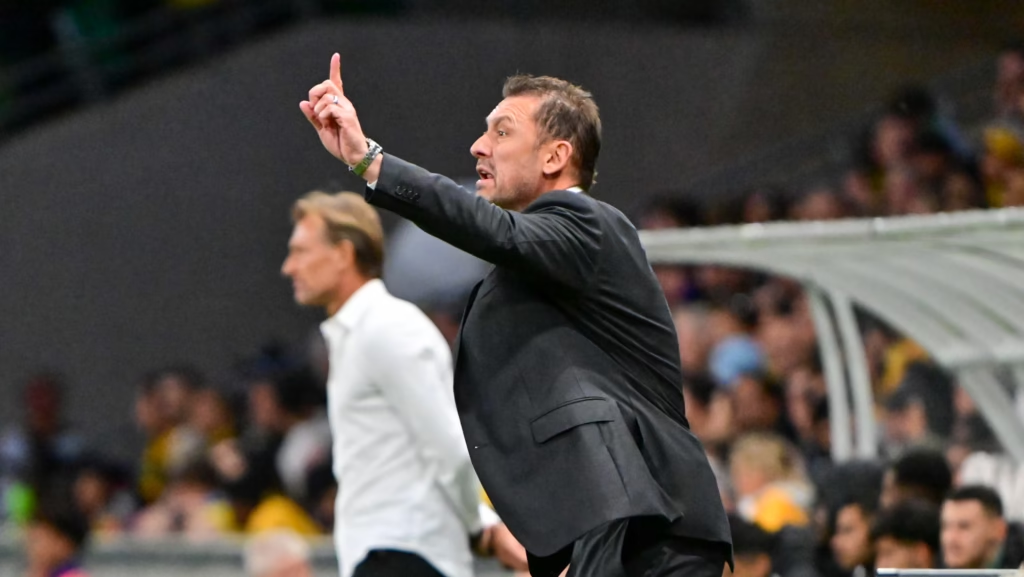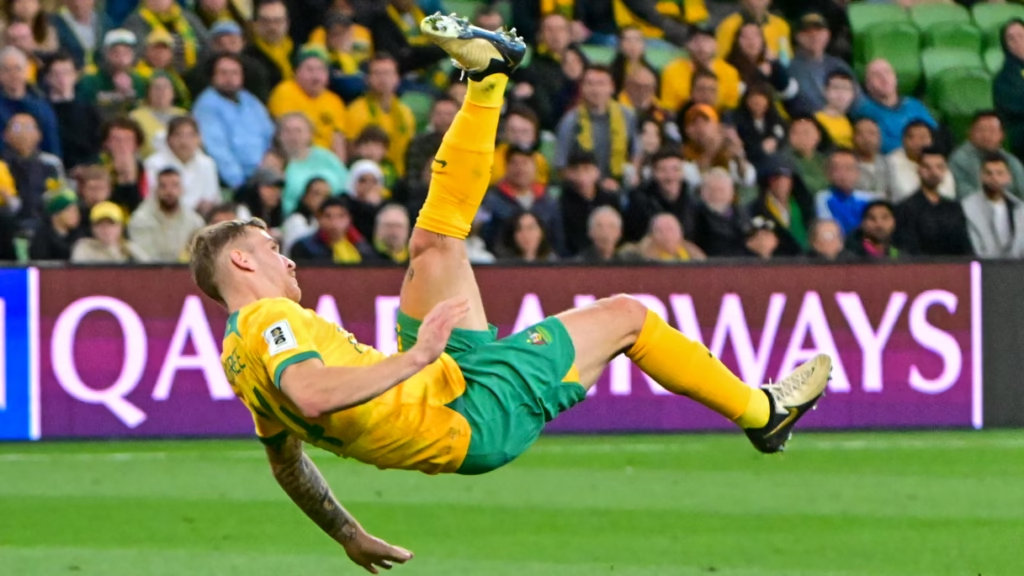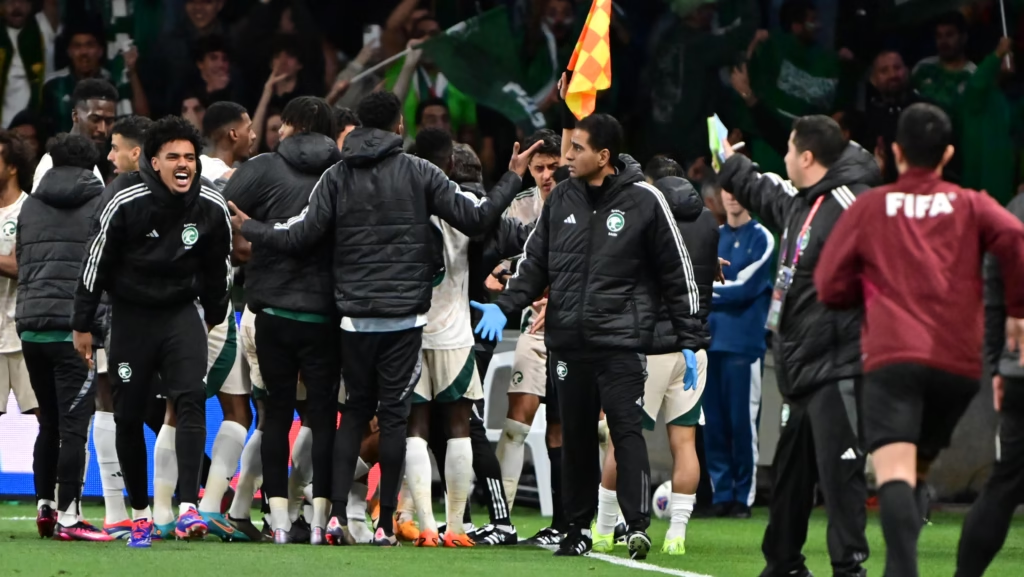
The Socceroos huddle pre match against Saudi Arabia. Photo: Marcus Robertson / Round Ball Australia.
To qualify for a 48 team World Cup, the nation ranked #24 in the world should not have to do anything spectacular; win the games you’re supposed to – especially at home and be competitive with the teams around you. Do that, you’ll be just fine.
The Socceroos failed on both counts in their final two games under former head coach, Graham Arnold. A 1-0 loss to Bahrain and a 0-0 draw with Indonesia, was the catalyst for Arnie to end his tenure.
But, in their first two outings under Tony Popovic, the Aussies had ticked every box. A 3-1 come from behind win against China brought with it the familiar tonic of a new manager’s first appearance. A game that should’ve been won, won.
This was followed by a gutsy 1-1 draw away to Japan, a place where the Socceroos have never won in World Cup qualifying. A knuckle-down, put in the hard yards grind, that if fortune fell different, could have resulted in a victory. Competitive. Result. Success.
Then, Saudi Arabia at home. A chance to rid the demons of not just the previous cycle, but the fledgling beginnings of this phase as well. An opportunity to take on another giant of Asian football, at home and put their foot down.
But as the final seconds of an entertaining 0-0 draw drifted away at AAMI Park on Thursday night, so did Australia’s chances of proving that this wasn’t going to be like the last time.

It wasn’t the two losses to Japan that condemned Australia to the intercontinental playoff in the 2022 cycle. It was the draws that did the true damage: Oman, China and especially at home to Saudi Arabia. See where this is going?
Win that game at home and Australia enter the final day, against the same foe, with a different mindset. The knowledge that a win would’ve sent them through, the extra drive of something to play for, in a game where they only went on to lose 1-0.
It was the same scenario this time around. Exacerbated by the first two results in the group, the Socceroos likely need to come out ahead in the theoretical two-legged tie against The Green Falcons to secure automatic qualification in second place, and Saudi Arabian Coach Hervé Renard knows it too.
“We are at the middle of this group, everything is still open. Maybe we’ll have a very, very important game on the 10th of June in Saudi, against Australia. We never know,” Renard said post-match.
The Australians weren’t bad in this game and had several chances to go on and win it. The industrial Mitchell Duke almost earned his side a penalty inside 12 minutes. Souttar blazing one over, six yards out from the resulting free kick. Ajdin Hrustic and Jackson Irvine missing the right finish just before the half. Desperate Saudi defending somehow denying Riley McGree from what seemed like a certain tap in late on.
McGree seemingly decided to snap the difficulty barometer over his knee after that chance, his overhead bicycle attempt going just wide, a foot or two denying him one of the most famous goals in Australian football history.
“I saw the flight of the ball come and I knew pretty early what I was going to try and do, I think it was a bit shinny, but yeah I just tried to get it on target. Unfortunately, just missed,” he said.
“I think if it comes off my foot, I say it could have, should have, would have gone in, but I think obviously a little bit of fatigue might have played a part in that as well. But it is what it is.”

It wasn’t to be, but there were improvements to be seen in general play throughout the game. Baiting in the first pack of the Saudi press to play a line skipping ball either to the six, or on a 45 to an overlapping wing back, seemed to be the objective in deep build up. Popovic respected the Saudi press and as a result instructed his team to play fewer short passes out of defence than we saw against China, in Adelaide.
Joe Gauci looked a little shaky with the ball at his feet in the first half, however was outstanding in his shot stopping responsibilities. A spectacular double save the highlight despite the fact the offside flag would be raised, unbeknownst to him. McGree proved again he can be one of the sparks of creativity the Socceroos were missing during his run with injury. And as Popovic spoke to post game, the midfield pair of Irvine and Aiden O’Neill’s second half significantly improved the way the Aussies looked on the ball.
“It was a really difficult game, tough match, a real World Cup qualifier. They brought a lot of energy in the first half, I don’t think we coped with that very well. We weren’t very good with the ball, and we looked a little bit heavy and lethargic in the first half,” said Popovic.
“We created two very good opportunities from good pressing moments, so without the ball we did some really good things and probably should have scored one of those chances.
“We improved significantly in the second half and started controlling the game a lot more and created some really good opportunities in the second half.
“We take the point from today, we move forward, it’s another positive result. Not the three points that we wanted, I think we can do a lot better and we’ve got work to do, but we were also very hard to beat today.”
So here we are, more positive signs yet devoid of an important victory. We’re at the halfway point of the group now. The Socceroos even on six points with both Saudi Arabia and China. Next week’s opponents Bahrain, only one point behind on five. Japan likely uncatchable, leaving second spot as the primary target. It all feels very familiar, for good reason.
This is the kind of situation that gave rise to the ‘Aussie DNA’ tag, used frequently by Graham Arnold to describe the frame of mind and commitment to defy adversity that carried the Socceroos through the last World Cup qualifying campaign, and into the last 16 of the Qatar 2022 finals.
The innate ability to find a way to claw back against probable demise. It’s often mocked, but the raw dedication and buy in from the team towards the end of the last cycle was undeniable. And those traits will have to be relied upon again, starring down the barrel of Japan, and then Saudi Arabia away in the final window of this group – the exact same run in we saw in 2022.
Perhaps a win would have been too simple for the Socceroos. Three points that would have left them with a little bit of breathing room in second place. They would have earned the advantage, positioned themselves as the hunted. Saudi Arabia and the likes would have been chasing them down. Doesn’t sound like the typical Socceroos story.
Of course, Australia nearly lost this game as well. By a matter of inches, as Sultan Al Ghannam’s stoppage time heart breaker was denied by an offside flag. It was excruciatingly tight. No matter how many times you watch the broadcast angles, you won’t be any closer to absolute certainty either way.

But a loss here for the Socceroos wouldn’t have fit the bill either. The prospect of being three points down to Saudi Arabia with the return trip to follow, may have been too much to overcome. To get full use of your Aussie DNA, you have to live in that zone of plausibility. Things can’t come too easy, but the deficits also have to be reasonably recoverable. A Goldilocks area of tension that keeps you hanging on, with the opportunity for spectacular recovery always around the corner.
By the measure of inches, Australia still has a competitive foot in the race. An opportunity in the return leg, to again overcome adversity, prove everyone wrong, do the implausible and qualify directly for the World Cup. So perhaps after all, the so-called Aussie DNA isn’t about grinding your way out of tough situations. Maybe it’s about always finding a way to put yourself in them in the first place.
If fighting their way out of a corner is so ingrained in this team, is it really such a surprise that we find ourselves backed into one over and over again?
None of this is anyone’s fault in particular, especially not Popovic. In the context of his short time in charge, a draw against a top team represents a steadying of the ship. But in the larger view of the Socceroos’ last decade, it’s another missed opportunity.
